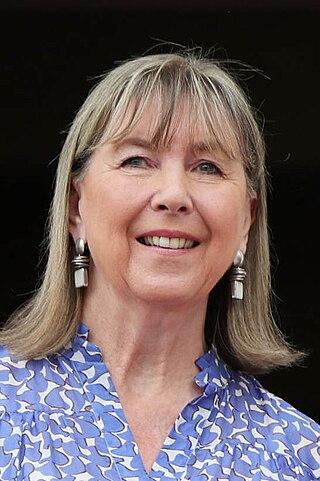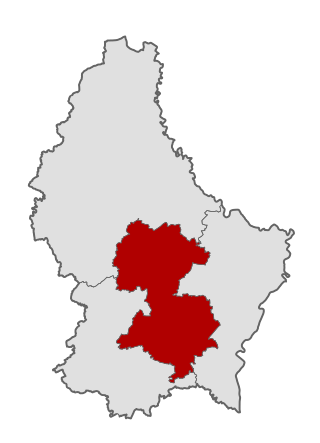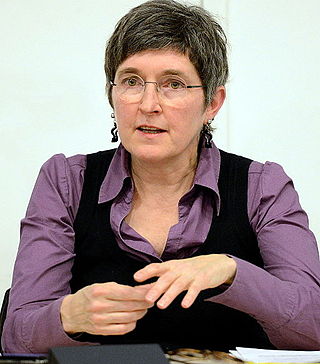External links
- (in French) Official Chamber of Deputies biography
Jean-Pierre Klein (born 24 January 1944 in Heisdorf) [1] is a Luxembourgish politician for the Luxembourg Socialist Workers' Party (LSAP) and jurist. He has been a member of the Chamber of Deputies for the Centre constituency since the 1994 election. He is also the mayor of Steinsel: a position that he has held since 1 January 1988. [1]
Klein was not elected at the 2004 election, falling just short (in 5th place on the LSAP list, which won 4 seats in Centre). However, Robert Goebbels, who had placed third, [2] resigned his office before the new Chamber was sworn in, allowing the next-placed Klein to take his place. [3]
Luxembourg is a parliamentary representative democratic monarchy, whereby the prime minister is the head of government, and the multi-party system. Executive power is under the constitution of 1868, as amended, exercised by the government, by the grand duke and the Council of Government (cabinet), which consists of a prime minister and several other ministers. Usually, the prime minister is the leader of the political party or coalition of parties having the most seats in parliament. Legislative power is vested in both the government and parliament. The judiciary is independent of the executive and the legislature.

The Christian Social People's Party is the largest political party in Luxembourg. The party follows a Christian democratic and conservative ideology and has been described as centre to centre-right. Furthermore, akin to most parties in Luxembourg, it is strongly pro-European. The CSV is a member of the Christian Group, European People's Party, and the Centrist Democrat International.

The Luxembourg Socialist Workers' Party, abbreviated to LSAP or POSL, is a social democratic, pro-European political party in Luxembourg. The LSAP sits on the centre-left of the political spectrum.

The Democratic Party, is the major social-liberal political party in Luxembourg. One of the three major parties, the DP sits on the centre to centre-right, holding moderate market liberal views combined with a strong emphasis on civil liberties, human rights, and internationalism.

Lydie Polfer is a Luxembourgish politician who has served in a number of capacities, including Deputy Prime Minister, Minister for Foreign Affairs, and Mayor of Luxembourg City, as well as a Member of the European Parliament (MEP) and a member of the Chamber of Deputies. She is a member of the Democratic Party (DP).

The Alternative Democratic Reform Party is a conservative and mildly populist political party in Luxembourg. It has five seats in the sixty-seat Chamber of Deputies, making it the fourth-largest party. In 2024, the party received its first seat in the European Parliament.

Lucien Lux is a politician and trade unionist from Luxembourg. A member of the Luxembourg Socialist Workers' Party, Lux was in the government from 2004 until 2009, under Jean-Claude Juncker.

Nicolas Schmit is a Luxembourgish politician serving as European Commissioner for Jobs and Social Rights since 2019. A member of the Luxembourg Socialist Workers' Party (LSAP), he was the EU-wide Spitzenkandidat of the centre-left PES at the 2024 EU elections. He was previously a member of the government of Luxembourg from 2004 to 2019 and a member of the European Parliament (MEP) in 2019.

The Chamber of Deputies, abbreviated to the Chamber, is the unicameral national legislature of Luxembourg. The metonym Krautmaart is sometimes used for the Chamber, after the square on which the Hôtel de la Chambre is located.

South is one of the four multi-member constituencies of the Chamber of Deputies, the national legislature of Luxembourg. The constituency was established in 1919 following the introduction of proportional representation for elections to the Chamber of Deputies. It consists of the cantons of Capellen and Esch-sur-Alzette. The constituency currently elects 23 of the 60 members of the Chamber of Deputies using the open party-list proportional representation electoral system. At the 2023 general election it had 111,884 registered electors.

East is one of the four multi-member constituencies of the Chamber of Deputies, the national legislature of Luxembourg. The constituency was established in 1919 following the introduction of proportional representation for elections to the Chamber of Deputies. It consists of the cantons of Echternach, Grevenmacher and Remich. The constituency currently elects seven of the 60 members of the Chamber of Deputies using the open party-list proportional representation electoral system. At the 2023 general election it had 40,246 registered electors.

North is one of the four multi-member constituencies of the Chamber of Deputies, the national legislature of Luxembourg. The constituency was established in 1919 following the introduction of proportional representation for elections to the Chamber of Deputies. It consists of the cantons of Clervaux, Diekirch, Redange, Vianden and Wiltz. The constituency currently elects nine of the 60 members of the Chamber of Deputies using the open party-list proportional representation electoral system. At the 2023 general election it had 52,922 registered electors.

Centre is one of the four multi-member constituencies of the Chamber of Deputies, the national legislature of Luxembourg. The constituency was established in 1919 following the introduction of proportional representation for elections to the Chamber of Deputies. It consists of the cantons of Luxembourg and Mersch. The constituency currently elects 21 of the 60 members of the Chamber of Deputies using the open party-list proportional representation electoral system. At the 2023 general election it had 81,687 registered electors.

Claude Meisch is a Luxembourgish politician with a degree in financial mathematics from Trier university. Meisch was appointed Minister of Education in 2013 in the government of Xavier Bettel, a post he held until 2023. He was appointed Minister of Education and Youth and as Minister of Housing in 2023 in the government of Luc Frieden He has been a member of the Chamber of Deputies from 1999 to 2013 and Mayor of Differdange since 2002. He was President of the Democratic Party (DP) from 2004 until 2013, of which he has been a member since 1994.

Romain Schneider is a Luxembourgish politician for the Luxembourg Socialist Workers' Party (LSAP). He is a member of the national legislature, the Chamber of Deputies, representing the Nord constituency since the 2004 election.
General elections were held in Luxembourg on 7 June 2009, together with the 2009 election to the European Parliament. All sixty members of the Chamber of Deputies were elected for five years. The polls were topped by the Christian Social People's Party, which built upon its already high number of seats to achieve a commanding victory, with the highest vote share and number of seats of any party since 1954. Incumbent prime minister Jean-Claude Juncker, who was the longest-serving head of government in the European Union, renewed the coalition agreement with Deputy Prime Minister and Luxembourg Socialist Workers' Party leader Jean Asselborn and formed the Juncker-Asselborn Ministry II, which was sworn in on 23 July 2009.
The following lists events that happened during 1964 in the Grand Duchy of Luxembourg.

Early general elections were held in Luxembourg on 20 October 2013. The elections were called after Prime Minister Jean-Claude Juncker, at the time the longest-serving head of government in the European Union, announced his resignation over a spy scandal involving the Service de Renseignement de l'État (SREL). The review found Juncker deficient in his control over the service.

General elections were held in Luxembourg on 14 October 2018. All 60 seats of the Chamber of Deputies were renewed.

Renée Wagener is a Luxembourgish journalist, sociologist, historian, and former politician. She served for 10 years in the Chamber of Deputies as a member of The Greens.